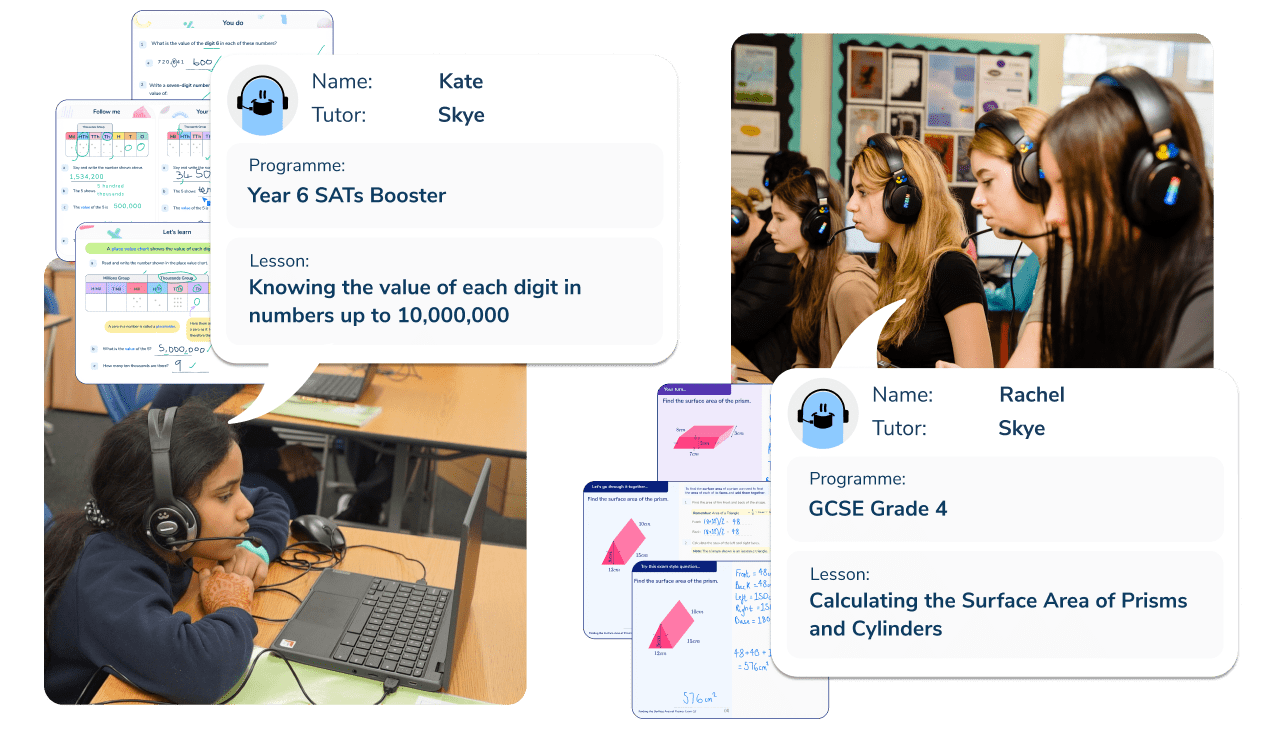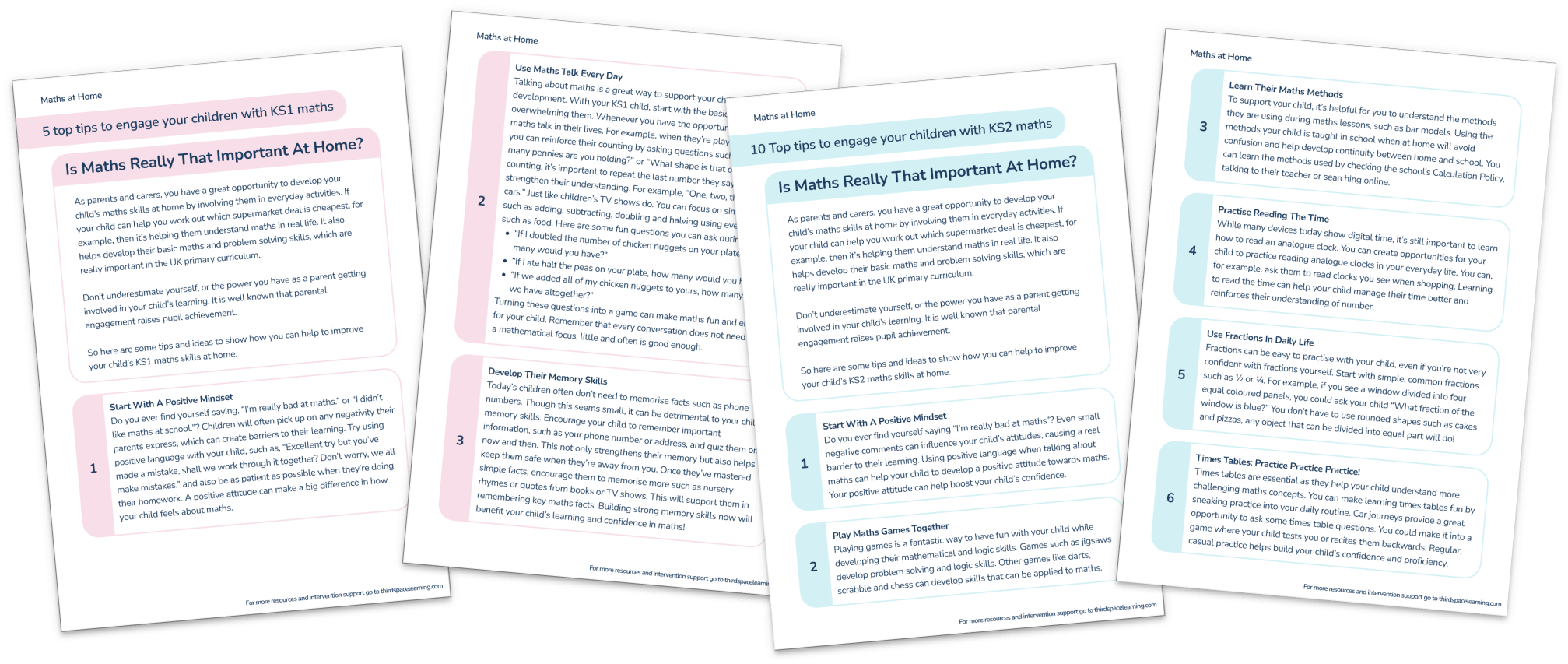How To Increase Parent Engagement In Primary Schools And Improve Outcomes In Maths
Whatever your school community, as a school leader, the issue of parent engagement is likely to feature regularly in your staff, parent and governor meetings. Parents really do make the difference in pupil outcomes at primary schools, and it’s up to the SLT and school leadership to work with your community and harness them as a force for good. This is not just about getting the all important positive parentview results when Ofsted comes to call. This is about doing the best for the children in your care.
Here we look at some of the ways you can engage parents in their children’s learning and how you can support parents to help pupil progress at home. We’re focusing throughout on ways parents can help in maths, as that is our specialist area. However many of the same parent engagement strategies will apply to other subjects.
Why parents find it hard to engage in Maths
It can be particularly hard for parents to know how to help their children with maths homework. Often they complain that they themselves are “bad” at Maths or that they “never learned anything useful in Maths at school”. Unfortunately some are also willing to say these negative comments in front of their child, which then passes a negative attitude towards Maths or their ability in Maths onto the child.
Parents sometimes also complain that the mathematics curriculum doesn’t teach their children any life skills which again can quickly influence a child’s own attitude to Maths.
The final most common reason is that parents themselves suffer from maths anxiety, they are scared of maths or of teaching their child the wrong method or getting the wrong answer.
What the evidence tells us about parent engagement
The Education Endowment Foundation lists parent engagement as moderate impact for moderate costs as part of its review interventions (read more on the most effective primary school interventions).
In their latest report they give 4 recommendations for working with parents:
- Critically review your parent engagement strategies as a school
- Provide practical learning strategies at home
- Tailor school communications to provide positive dialogue about learning
- Offer more sustained and intensive support where needed
The following ideas expand on these ideas further to give some practical actionable steps you can take to improve parent engagement in your school.

Meet Skye, the voice-based AI tutor making maths success possible for every student.
Built by teachers and maths experts, Skye uses the same pedagogy, curriculum and lesson structure as our traditional tutoring.
But, with more flexibility and a lower cost, schools can scale online maths tutoring to support every student who needs it.
Watch Skye in actionWhat we as school leaders and teachers can do to support parent engagement
1. Build relationships with parents
At the heart of all parental engagement is good relationships with parents. This isn’t always as easy as it sounds for a multitude of reasons that you will be all too aware of. Empathy. is key here and an understanding that every family who joins your school comes with their own back story, their own experiences and expectations. You will have supporters in all areas of the school community. Work with them first and build out from there. And try very hard to put to one side the concept of ‘hard to reach parents’. The onus is on us to reach them or find someone else they trust to reach them.
2. Give parents the tools to help
Often we need to reassure parents and provide them with the tools to support their child. This can be as simple as reminding them of the Calculation Policy which will be on your school website, or giving them some useful home learning packs.
Third Space has lots of home learning articles to support parents with maths at home, from teaching fractions to kids to working out what bodmas means. Also often helpful at primary school to explain how much of the curriculum does directly relate to real life. As a maths teacher, I always made sure I wrote down how each of my lessons was related to everyday life so I always had some good examples up my sleeve and never got caught out!
In fact parents are in the ideal position to build their children’s real life maths skills by involving them in real life maths problems. Every day adults have to negotiate maths problems around which car insurance company is providing the best deal or comparing a “buy one get one free” deal with a “buy 3 for 2” deal in the supermarket. Encourage them to get their children to have a go at helping them!
Maths at Home - 15 Top Tips for Parents and Carers
Our handy guide can help improve communication with parents and carers and, crucially, ensure continuity between home and school learning in maths
So here are some ideas for parent engagement and how you can help parents to help their children with Maths at home; better still download our free resource of top tips for KS1 and KS2 parents and carers to hand out at parents evening or pop into the schoolbag home.
3. Model a positive attitude to Maths
Before any learning can take place at home, some parents will need to change their attitude towards maths themselves. Many parents have the attitude that they are “bad” at maths and pass negativity about maths onto their children.
If parents are at least aware of the effect of this attitude, then they can take steps towards being more positive about maths around their children.
4. Teach parents about growth mindset
Parents should be advised that maths is not just about getting things “right” every time. A lot of maths involves problem solving which is not a quick and easy exercise, as such pupils need to build up persistence and resilience.
Parents can support this by encouraging mistakes being made and viewing this a normal learning process, rather than a negative experience. This kind of approach to learning will help parents to enable the child to develop a growth mindset, where the pupil is more willing to make mistakes and try again.
5. Run events to help parents to learn new maths teaching methods
Lots of parents want to help their children but are not sure how, or they try to teach their children the methods they learnt in school which can confuse pupils.
Instead, schools can help minimise this confusion by being open with parents about the methods they are using in Maths in school and could offer to teach parents these methods so they can help support their children at home.
You’ll be amazed at how many parents don’t even know about your school’s calculation policy for example.
Organise a parents morning session where they can come in and learn from you, or even better, their own children, the new maths teaching methods used in classrooms such as the the long division method and the bar model.
This will ensure continuity between school and home learning and lead to a more solid understanding of mathematical methods for the child.
6. Introduce lots of maths games for parents to play with their children
Games can be a really positive way for children to learn – if correctly implemented. Many games actually involve maths and can help children with counting, problem-solving, learning shapes and spatial awareness.
Board games are a great way for parents to engage with their children and games such as snakes and ladders and chess and even Minecraft can encourage the development of mathematical skills and spatial awareness that are transferable in school!
We’ve also created 25 fantastically fun maths games for kids to do at home.
7. Find the maths in the everyday
Talking about maths is really important for children to practise, as this allows them to develop their mathematical reasoning as a precursor to access harder questions. Parents can encourage their children to talk about Maths in everyday situations, such as prices at the supermarket or counting physical objects.
This is also really useful for helping children understand how maths links to the real world. We’ve got lots of suggestions for linking maths to the real world in our article on maths investigations for KS2.
Advise parents that it’s more useful to develop their child’s questioning – just like a teacher would – than to give them the correct answer, even if they’re tempted! Why not provide parents with example questions such as “why did you write that down?” or “how did you get that answer?” so they can then develop their own questioning in the classroom techniques for the benefit of their child.
This, in turn, means that the child can become a more effective independent learner and also master whatever skill or method they are attempting to learn.
8. Reward the small successes as well as the big
Use phone calls home or class certificates not just for the major piece of work but perhaps for a particular breakthrough in maths, or maybe when a child took the time to explain a concept clearly to their learning or talk partner. It is very effective to organise a ‘positive phone call home’ particularly if you are teaching the child the next year and the parent has not attended parents evening. Another topic for a phone call home could be regarding a change in recent behaviour that was communicated at parents evening.
Ending the year on a positive note, reflecting on achievements and what they could do next year is a great way to keep parents engaged. Particularly in Year 6, where there will have been a heavy emphasis on SATs, this is a great chance to reflect on the wider achievements, not just those in core subjects.
9. Make the most of parents evening
It’s inevitable that some parents won’t be able to attend. For those that do, remember to make it a two-way conversation. As teachers and SLT we should try to encourage parents to reflect on how their child has got on this year with probing questions.
- Is there anything in particular you think they have engaged well with this year?
- Where do you feel they have made the most improvement?
- What have they spoken to you about at home?”
Of course, these may not always elicit positive responses, but it does help build a better relationship. You’ll be amazed how often you’ll make a discovery this way.
10. Capture successes on screen with photos and videos
Lots goes on in schools that parents know nothing about. Capture these class or individual moments on camera to share internally and parents can’t help but be thrilled. If you’re having a school event such as a parents evening or class assembly, you could display the images as a slideshow in the background. If teachers are looking for end of term activities in ICT, they could task pupils with creating their own slideshow or video using the photos.
Film each child individually and ask them for their input on what they’ve liked most in the year so far, or what they’ve learnt, or achieved or improved on.
Free printable handout for parents and carers to help with maths at home
For handouts that include prompting questions for parents, download this free Maths at Home Guide for Parents and Carers.
Once parents can develop a positive mindset and learn a few methods and techniques to support their children’s maths education at home, they can be a very useful resource for the school and teachers to use.
DO YOU HAVE STUDENTS WHO NEED MORE SUPPORT IN MATHS?
Skye – our AI maths tutor built by teachers – gives students personalised one-to-one lessons that address learning gaps and build confidence.
Since 2013 we’ve taught over 2 million hours of maths lessons to more than 170,000 students to help them become fluent, able mathematicians.
Explore our AI maths tutoring or find out about an online maths tutor for your school.






